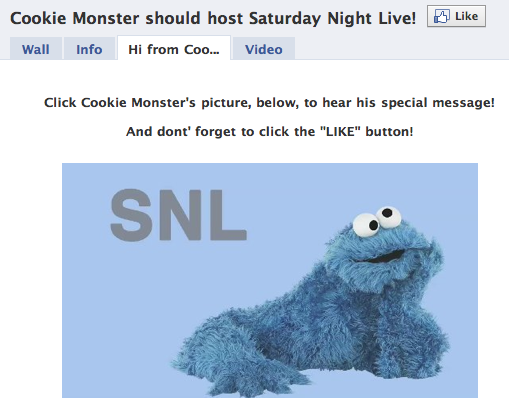 Tweets about watching a Cookie Monster audition video to help him land a gig hosting SNL started showing up in my Twitter stream this week. While I typically tweet about things like old and new media, public relations, and Montessori, I couldn’t resist retweeting the plea. Yes, you read that right. A Montessori mom who doesn’t let her 3-year-old watch television, including Sesame Street, was one of the people who helped Cookie Monster’s video reach 1 million views today after just four days online.
Tweets about watching a Cookie Monster audition video to help him land a gig hosting SNL started showing up in my Twitter stream this week. While I typically tweet about things like old and new media, public relations, and Montessori, I couldn’t resist retweeting the plea. Yes, you read that right. A Montessori mom who doesn’t let her 3-year-old watch television, including Sesame Street, was one of the people who helped Cookie Monster’s video reach 1 million views today after just four days online.
Upon reflection, I realize I did it because Sesame Street’s Cookie Monster SNL campaign (there’s also a new Cookie Monster Facebook page that has garnered almost 100,000 “likes” in four days) is cute, funny, and irresistable—an excellent example of using social media and crowdsourcing to help elevate a brand.
Crowdsourcing is leveraging the power of a crowd to accomplish amazing things, and it is changing the nature of research, writing, innovation, disaster relief, and fundraising to name a few. The Cookie Monster SNL campaign is actually a form of crowd voting, one of four crowdsourcing flavors:
- Crowd voting leverages a community’s judgment to organize, filter, rank, or lobby for a cause, product, or type of content (i.e., music, movies, etc.). Another great example of crowd voting is the Pepsi Refresh Project, an effort by the makers of Pepsi to use crowdsourcing for social good (and elevating its brand). Pepsi has been giving away $1.3 million every month this year to the ideas Americans select as the best in online voting.
- Crowd wisdom is using the collective opinion of a group of individuals to solve a problem, predict future outcomes, write or translate articles, or help direct corporate strategy. One of the best examples of this type of crowdsourcing is Ushahidi, an activist mapping tool collecting eyewitness reports sent in by e-mail and text message. Ushahidi’s maps were the heros of the Haitian and Chilean earthquakes, helping relief workers save thousands of lives.
- Crowd creation is tapping into the creative powers of a group of individuals to create original works of knowledge or art. Director Tim Burton is currently using crowd creation via Twitter to create a new story for his Stainboy character. From now until December 6, the best storylines tweeted to Burton’s @burtonstory Twitter account will be used in his new script.
- Crowd funding pools the money of many individuals to fund a project, organization, or effort. A great example of crowdfunding is Kiva, a microlending website helping aspiring entrepreneurs in developing countries find financing for their projects.
Will crowdsourcing land Cookie Monster a spot on SNL. Maybe? A Facebook campaign worked to help land Betty White a hosting spot on SNL earlier this year. All the hype paid off big for NBC too. White’s hosting turn drew in 12.1 million viewers, SNL‘s highest rating in 18 months.
Do you think Cookie Monster is a crowdsourcing genius? Please share you thoughts in the comments section below.
I disagree with your Kiva example and your definition of crowd funding. I think crowd funding is limited to gifts or donations with no expectation that the funds will be repaid. Kiva doesn’t qualify as crowd funding because recipients receive loans that they have to pay back. Network for Good would be a far better example.
Thanks for taking the time to comment, Jessie! You make a good point. 🙂